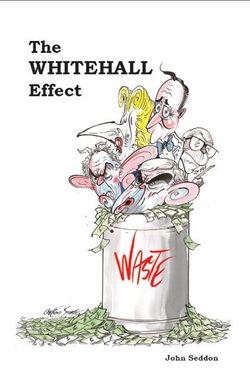The Whitehall Effect ~ John Seddon - Online Notes
|
Links below take you to the chapter notes:
Introduction 1. Prelude Part 1: The industrialisation of public services 2: Call centres 3. Back Offices 4. Shared Services 5. Outsourcing 6. Information Technology Part 2: Delivering services that work Introduction 7. A better philosophy 8. Effective change starts with ‘study’ 9. Better thinking, better design 10. ‘Locality’ working 11. IT as pull, not push Part 3: Things that make your head hurt 12. Targets and standards make performance worse 13. Inspection can’t improve performance 14. Regulation is a disease 15. It’s the system, not the people 16. Incentives always get you less Part 4: ideology, fashions and fads 17. Choice 18. Personal Budgets 19. Commissioning 20. Managing demand 21. Nudge 22. Procurement 23. Risk management 24. Lean 25. IT: features over benefits Part 5 Change must start in Whitehall 26. Beware economists bearing plausible ideas 27. Whitehall is incapable of doing evidence 28. Getting a focus on purpose |
2: Call centres
1] “Failure demand: ‘demand caused by a failure to do something or do something right for the customer’.” John Seddon, 2003, Freedom from Command and Control, Vanguard Education, p.26. 2] From Hansard, ‘Written Answers to Questions’ 21 February 2005, Col 337W Local Government. View 3] See a short animation about the DECATS process which aimed to simplify and standardise processes across local government. View 4] Hansard, 24 February 1998, Vol 307, Col 155, The Secretary of State for Health (Mr. Frank Dobson) “We are to introduce NHS direct, and we are running pilot schemes from 1 April. We intend to have a scheme covering the entire country. People will be able to ring in to talk about their condition and receive advice from a nurse-organised help line. We believe that that will be effective and popular.” View Hansard, 9 July 1998, Vol 315, Col 1252, Frank Dobson: “‘It is clear that many people are willing to ring the 24-hour helpline knowing that it is there for 24 hours. Some of them, because they are considerate of others, are reluctant to go to accident and emergency or ring for a doctor or ambulance. In some cases, people who clearly would not have rung for an ambulance have rung NHS direct and ambulances have been sent round straight away because the cases were urgent. In many cases, nurses have given immediate reassurance to concerned parents, the children of elderly parents and people worried about their neighbours. It has been a great success and I commend the people who have been carrying it out.” View 5] The Times, November 26, 2001, ‘We need more time’. Byline: Alice Miles. 6] See ‘The Vanguard Method in Wellbeing’ for more on failure demand in healthcare. View 7] James Munro, John Nicholl, Alicia O’Cathain and Emma Knowles, 2000, ‘Impact of NHS Direct on demand for immediate care’, British Medical Journal, 321:150-153. 8] The Telegraph, 9 February 2011, ‘The chequered history of NHS Direct’. Byline: Stephen Adams. View 9] Health Which? ,August 2000, ‘NHS Direct Investigated’ pp.12-16. 10] BBC News, 12 June 2007, ‘NHS Direct “a strain on system”’. Byline: Nick Triggle. View 11] The Telegraph, 24 October 2008, ‘Every call to NHS Direct costs £25’. Byline: Kate Devlin. View 12] Ibid. 13] BBC Radio 4, 18 August 2013, ‘Face the Facts’. View 14] Ibid. 15] The Guardian, 2 July 2013, ‘NHS Direct pulls out of two 111 medical helpline contracts’. View 16] Channel 4 Dispatches, 29 July 2013, ‘Undercover in NHS 111’. Byline: Luke Denne. View The Independent, 29 July 2013, ‘NHS Direct aims to pull out of 111 contracts leaving non-emergency phone line on brink of collapse’. Byline: Charlie Cooper. View 17] Her Majesty’s Inspectorate of Constabulary (HMIC), 2005, First Contact: A Thematic Inspection of Police Contact Management, p.11: “The growth of commercial and public sector call centres has been echoed in policing. In the last ten years, 33 of the 43 police forces in England and Wales have centralised or consolidated their call handling function, either physically or using technology to deliver a ‘virtual’ centralised contact centre service. Undoubtedly, the Best Value principles and the drive for economies of scale have played a large part in this move.” View 18] Audit Commission, 2002, Learning from Inspection: Housing Repairs and Maintenance. View |

